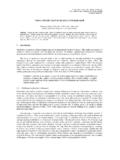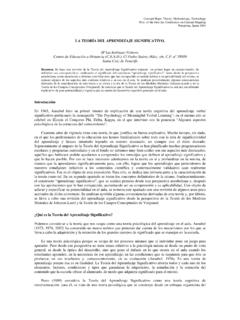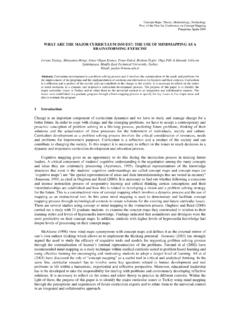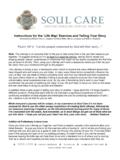Transcription of WHAT ARE THE MAJOR CURRICULUM ISSUES?: …
1 Concept Maps: Theory, Methodology, Technology Proc. of the First Int. Conference on Concept Mapping Pamplona, Spain 2004 what ARE THE MAJOR CURRICULUM ISSUES?: THE USE OF MINDMAPPING AS A BRAINSTORMING EXERCISE Fersun Payko , B nyamin Mengi, P nar Olgun Kamay, P nar nkol, Birikim zg r, Olga Pilli & Hamide Y ld r m ahinkayas , Middle East Technical University, Turkey Email: Abstract. CURRICULUM development is a problem solving process and it involves the consideration of the needs and problems for the improvement of the programs and the implementation of solutions and alternatives for learners and their contexts.
2 CURRICULUM is a reflection and a product of the society and can contribute to the change in the society. It is necessary to reflect on the issues to reach decisions in a dynamic and responsive CURRICULUM development process. The purpose of this paper is to identify the MAJOR curricular issues in Turkey and to relate them to the universal context in an integrative and collaborative manner. The issues were established in a graduate program through a brain mapping process to specify the key issues in five MAJOR areas and also to evaluate the program. 1 Introduction Change is an important component of CURRICULUM dynamics and we have to study and manage change for a better future.
3 In order to cope with change and the emerging problems, we have to accept a contemporary and proactive conception of problem solving in a life-long process, predicting future problems, thinking of their solutions and the actualization of these processes for the betterment of individuals, society and culture. CURRICULUM development as a problem solving process involves the critical consideration of resources, needs and problems for improvement purposes. CURRICULUM is a reflection and a product of the society and can contribute to changing the society.
4 In this respect it is necessary to reflect on the issues to reach decisions in a dynamic and responsive CURRICULUM development and education process. Cognitive mapping gives us an opportunity to do this during the instruction process in training future leaders. A critical component of students' cognitive understanding is the negotiation among the many concepts and ideas they are continually processing (Ayersman, 1995). Graphical representations of the knowledge structures that exist in the students cognitive understandings are called concept maps and concept maps (or "cognitive maps") are "the spatial representation of ideas and their interrelationships that are stored in memory" (Jonassen, 1993, as cited in Oughton and Reed (2000).)
5 It is necessary to find out whether following a conscious and intense instruction process of cooperative learning and critical thinking certain conceptions and their interrelationships are established and how this is related to developing a vision and a problem solving strategy for the future. This is a constructivist view of concept mapping which involves a dynamic process and the use of mapping as an instructional tool. In this sense mind mapping is used to demonstrate and facilitate concept mapping process through technological contexts to create solutions for the existing and future curricular issues.
6 There are several studies using concept or mind mapping in the instruction process. Oughton and Reed (2000) carried out a study with 21 graduate students to examine the concept maps they constructed in relation to their learning styles and levels of hypermedia knowledge. Findings indicated that assimilators and divergers were the most productive on their concept maps. In addition, students with higher levels of hypermedia knowledge had deeper levels of processing on their concept maps. McAleese (1998) view mind maps synonymous with concept maps and defines it as the external mirror of one s own radiant thinking which allows us to implement the thinking potential.
7 Jonassen (2003) has strongly argued the need to study the efficacy of cognitive tools and models for supporting problem solving process through the externalization of learner s internal representations of the problems. Farrand et al (2002) have recommended mind mapping as a study technique within medical curricula suited to problem based learning and using effective training for encouraging and motivating students to adopt a deeper level of learning. All et al (2003) have discussed the role of concept mapping as a useful tool in critical and analytical thinking.
8 In the same line, curricular research has to involve some key questions related to human development and real problems in life within a humanistic, experiential and reflective perspective. Moreover, educational leadership has to be developed to take the responsibility for dealing with problems and continuously developing reflective solutions. It is necessary to reflect on the issues and relate theory to practice in different contexts. Within the light of these, the purpose of this paper is to identify the MAJOR curricular issues in Turkey using mind mapping through the perceptions and experiences of future CURRICULUM experts and to relate them to the universal context in an integrated and collaborative approach.
9 2 Method For the examining the curricular issues, a mind mapping process was actualized with a small group of six graduate students in the doctorate program carried out at Middle East Technical University, Department of Educational Sciences. The students who took part in the process were registered to the CURRICULUM : Theory and Research course which was offered to CURRICULUM and instruction majors who will be future experts in the field. The course mainly involved the study of various theoretical perspectives, research opportunities and their implications for practice in a seminar mode.
10 Throughout the course, the students were expected to conduct a CURRICULUM analysis project by making use of the ideas and theoretical background covered during the course. At the end of the term a brain storming activity took place, which aimed to discuss and identify the MAJOR curricular issues in Turkey. During the brainstorming activity, the students first individually and then as a group produced 12 curricular issues. The issues were reflected upon in an integrative manner by using a computer based mind/brain mapping program which was called Mind Mapper Professional Standard Edition.









